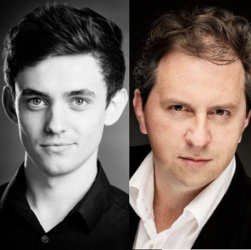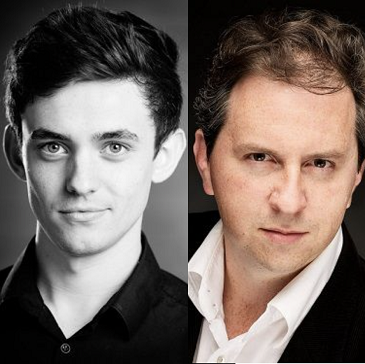 United Kingdom Gurney, Ireland, Venables, McElroy: Andrew Randall (baritone), Eric McElroy (piano), Gregory Leadbetter (reader). Ivor Gurney Hall, Gloucester, 17.10.2021. (JQ)
United Kingdom Gurney, Ireland, Venables, McElroy: Andrew Randall (baritone), Eric McElroy (piano), Gregory Leadbetter (reader). Ivor Gurney Hall, Gloucester, 17.10.2021. (JQ)

Ivor Gurney – ‘Desire in Spring’; ‘Goodnight to the Meadow’; ‘In Flanders’; ‘Sleep’
John Ireland – Marigold
Ian Venables (b.1955) – The Pine Boughs Past Music Op.39 (2010)
Eric McElroy (b.1992) – The Fetch: Five Poems of Gregory Leadbetter (2019)
This recital was given under the auspices of Gloucester Music Society. The setting, the Ivor Gurney Hall, was extremely appropriate. It was until quite recently part of the King’s School – latterly used as a gymnasium. Now converted into a very pleasing small concert hall, it stands right in the shadow of Gloucester Cathedral. I think I am right in saying that when Gurney attended the school during his time as a Cathedral chorister he was schooled in that very room.
This was a return visit for Andrew Randall and Eric McElroy. Back in 2019 I enjoyed very much a concert in which they joined the Carducci Quartet to perform Gurney’s The Western Playland (and of Sorrow) and Ian Venables’ cycle, The Song of the Severn (review). Music by both composers was on this programme also.
They began with four songs by Gurney. In ‘Desire in Spring’ I was impressed with the evenness and clarity of Andrew Randall’s singing. These qualities, and clarity of diction, were in evidence throughout the afternoon. In ‘Goodnight to the Meadow’ we heard the upper register of his voice to good advantage. ‘In Flanders’ is a wonderful song, setting words by the composer’s lifelong friend, Will Harvey. The song is a reflective paean to Gurney’s beloved Gloucestershire and I thought Randall and McElroy conveyed very well the music’s melancholy rapture. Finally, we heard ‘Sleep’ in a very expressive performance during which I admired Eric McElroy’s sensitive pianism.
Next came the three songs which John Ireland grouped together under the title Marigold – An Impression. I later discovered that the songs were composed in 1913; it was unfortunate that there was no information about any of the music in the programme book – though the texts were printed – and the performers didn’t introduce them. Ireland wrote songs throughout his career – about 80 in total – so he is not an insignificant song composer. I confess that I don’t always find myself greatly drawn to Ireland’s songs, with a few exceptions, though I am sure the fault is mine. These three songs didn’t make the strongest impression on me today, though that is no reflection on Randall and McElroy. I thought they performed all three well and with conviction.
Ian Venables song cycle, The Pine Boughs Past Music was, in a sense, coming home this afternoon. It was commissioned by Gloucester Music Society in 2010 to mark their 80th anniversary and I attended the first performance, in the nearby church of St Mary de Lode (review). How fitting that it should be revived in this hall, named after Gurney, since Venables set three Gurney poems in the cycle while his fourth choice was ‘In Memoriam Ivor Gurney’ by Leonard Clark. The first performance was given by Roderick Williams. He subsequently made a very fine recording of the songs in a perceptive partnership with the pianist Graham J Lloyd (review). I made a deliberate decision not to listen to that recording in advance of this performance, so I came to the songs with fresh ears.
These are very fine songs. The first, ‘My heart makes songs on lonely roads’ sets a poem which Gurney wrote in late 1917; it concerns his unrequited love for Annie Drummond, the nurse who cared for him in hospital in Edinburgh. I thought Randall conveyed the yearning melancholy of words and music very successfully. ‘Soft Rain’ is a later poem. Here, I very much admired the way McElroy articulated the piano part in which Venables often illustrates most imaginatively the falling rain. The last of the four songs. ‘In Memoriam Ivor Gurney’ is the only one which doesn’t use a Gurney text but, naturally, his spirit permeates Leonard Clark’s poem, as it does the music to which Venables set the words. Randall and McElroy built this varied and eloquent homage to Gurney to a stirring climax. In the piano postlude Venables evokes most successfully the sound of the pealing of the bells of Gloucester Cathedral. By happy chance, the bells had been ringing, as they always do prior to Sunday Evensong, as we arrived at the hall for this recital. The Pine Boughs Past Music is an excellent set of songs, very typical of this composer. I suspect they have not been performed all that often since I first heard them in 2010. If that’s so then it is a great shame. All credit to Randall and McElroy, not just for reviving them but also for making such a good case for them. The composer was present and clearly was very pleased by what he heard.
The second half of the programme was devoted to the poetry of Gregory Leadbetter, who is Professor of Poetry at Birmingham City University. Before we heard the five poems set to music by McElroy, Leadbetter read a section of his poems, eight in all. Some were taken from his collection, The Fetch (2016) and his most recent collection, Maskwork (2020). The selection from The Fetch deliberately avoided any of the poems set by McElroy. In principle, it was a nice idea to have some poetry reading and Leadbetter offered a varied selection of poems. Unfortunately, too many poems were read; three or four would have sufficed. Furthermore, Leadbetter had a somewhat low-key delivery and I didn’t feel that he invested the words with sufficient interest or drama; he failed to hold my attention consistently. I could not help but recall an experience just a couple of weeks ago when, during a song recital, the tenor James Gilchrist read some of the poems that he was about to sing (review). Gilchrist invested all of the poems with far more feeling and colour than was on display on this occasion.
The five poems set by McElroy followed and I have to confess to some difficulty in evaluating at a first hearing what I heard. I had had the opportunity to read through the poems twice before listening to the musical settings. Two of them, ‘Statuary I’ and ‘Statuary II’, which are placed third and fourth in the set, I found I could assimilate quite well; but the other three, ‘Misterioso’, ‘Stalking’ and ‘This’, were much harder to absorb. Lacking a good understanding of the poems themselves, it was difficult for me fully to appreciate McElroy’s approach to the texts. His music is powerful and often dramatic. The poems are all serious in tone and McElroy responded with music of significant seriousness. Some of the poems that we had heard read demonstrated that there is a lighter side to Leadbetter’s art and I wish McElroy had chosen at least one poem in a less introspective vein; that might have provided welcome contrast. The piano parts, played with evident command by the composer, are fiercely independent of the vocal line; too much so, I came to feel. In addition, it seemed to me that the piano, with the lid fully open, rather overpowered the singer at times, something which hadn’t troubled me in the first half. Randall was a committed advocate for the songs, which are clearly as challenging for the singer as they are for the pianist.
After the performance of the songs, following warm applause for both performers and poet, McElroy sprang a little surprise. Returning to the platform, he told us that he didn’t like musical encores but poetry was a different matter. He then proceeded to recite from memory two poems, a highly amusing short poem by Ogden Nash and a longer poem by Stevie Smith. His delivery was excellent – much more animated than we had heard earlier from Leadbetter – and McElroy thereby offered a welcome segment of lightness in what had otherwise been a fairly introspective afternoon.
There was a good deal to admire in this recital. Andrew Randall asked our indulgence at the start of the afternoon; he was recovering from a bout of illness. I noticed a few isolated instances when the voice was not cleanly produced but these were minor blemishes; for the most part he sang very well indeed. Eric McElroy despatched a series of challenging piano parts with aplomb. I wish, however, that the programme had not been so heavily weighted in favour of introspective music. The Gurney selections and, for the most part, the Venables song cycle, tap that wonderful vein of melancholy that seems to come as second nature to English composers of art songs. The McElroy songs were also serious. It would have been welcome, therefore, if the Ireland songs had been replaced by something a little lighter in countenance.
John Quinn
